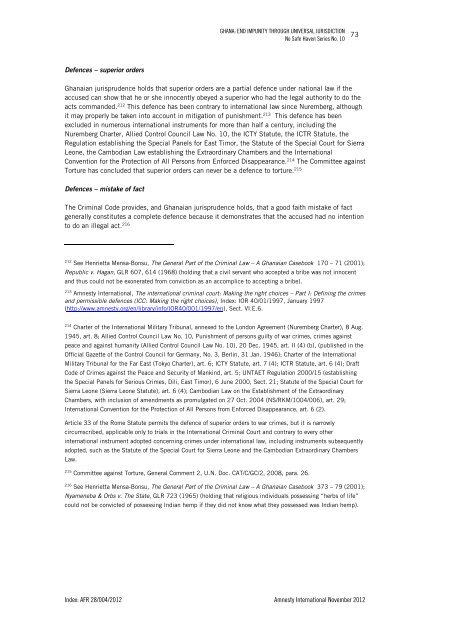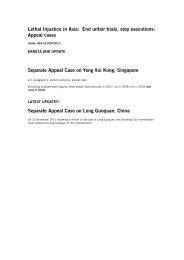Ghana - Amnesty International
Ghana - Amnesty International
Ghana - Amnesty International
Create successful ePaper yourself
Turn your PDF publications into a flip-book with our unique Google optimized e-Paper software.
GHANA: END IMPUNITY THROUGH UNIVERSAL JURISDICTIONNo Safe Haven Series No. 1073Defences – superior orders<strong>Ghana</strong>ian jurisprudence holds that superior orders are a partial defence under national law if theaccused can show that he or she innocently obeyed a superior who had the legal authority to do theacts commanded. 212 This defence has been contrary to international law since Nuremberg, althoughit may properly be taken into account in mitigation of punishment. 213 This defence has beenexcluded in numerous international instruments for more than half a century, including theNuremberg Charter, Allied Control Council Law No. 10, the ICTY Statute, the ICTR Statute, theRegulation establishing the Special Panels for East Timor, the Statute of the Special Court for SierraLeone, the Cambodian Law establishing the Extraordinary Chambers and the <strong>International</strong>Convention for the Protection of All Persons from Enforced Disappearance. 214 The Committee againstTorture has concluded that superior orders can never be a defence to torture. 215Defences – mistake of factThe Criminal Code provides, and <strong>Ghana</strong>ian jurisprudence holds, that a good faith mistake of factgenerally constitutes a complete defence because it demonstrates that the accused had no intentionto do an illegal act. 216212See Henrietta Mensa-Bonsu, The General Part of the Criminal Law – A <strong>Ghana</strong>ian Casebook 170 – 71 (2001);Republic v. Hagan, GLR 607, 614 (1968) (holding that a civil servant who accepted a bribe was not innocentand thus could not be exonerated from conviction as an accomplice to accepting a bribe).213<strong>Amnesty</strong> <strong>International</strong>, The international criminal court: Making the right choices – Part I: Defining the crimesand permissible defences (ICC: Making the right choices), Index: IOR 40/01/1997, January 1997(http://www.amnesty.org/en/library/info/IOR40/001/1997/en), Sect. VI.E.6.214Charter of the <strong>International</strong> Military Tribunal, annexed to the London Agreement (Nuremberg Charter), 8 Aug.1945, art. 8; Allied Control Council Law No. 10, Punishment of persons guilty of war crimes, crimes againstpeace and against humanity (Allied Control Council Law No. 10), 20 Dec. 1945, art. II (4) (b), (published in theOfficial Gazette of the Control Council for Germany, No. 3, Berlin, 31 Jan. 1946); Charter of the <strong>International</strong>Military Tribunal for the Far East (Tokyo Charter), art. 6; ICTY Statute, art. 7 (4); ICTR Statute, art. 6 (4); DraftCode of Crimes against the Peace and Security of Mankind, art. 5; UNTAET Regulation 2000/15 (establishingthe Special Panels for Serious Crimes, Dili, East Timor), 6 June 2000, Sect. 21; Statute of the Special Court forSierra Leone (Sierra Leone Statute), art. 6 (4); Cambodian Law on the Establishment of the ExtraordinaryChambers, with inclusion of amendments as promulgated on 27 Oct. 2004 (NS/RKM/1004/006), art. 29;<strong>International</strong> Convention for the Protection of All Persons from Enforced Disappearance, art. 6 (2).Article 33 of the Rome Statute permits the defence of superior orders to war crimes, but it is narrowlycircumscribed, applicable only to trials in the <strong>International</strong> Criminal Court and contrary to every otherinternational instrument adopted concerning crimes under international law, including instruments subsequentlyadopted, such as the Statute of the Special Court for Sierra Leone and the Cambodian Extraordinary ChambersLaw.215Committee against Torture, General Comment 2, U.N. Doc. CAT/C/GC/2, 2008, para. 26.216See Henrietta Mensa-Bonsu, The General Part of the Criminal Law – A <strong>Ghana</strong>ian Casebook 373 – 79 (2001);Nyameneba & Orbs v. The State, GLR 723 (1965) (holding that religious individuals possessing “herbs of life”could not be convicted of possessing Indian hemp if they did not know what they possessed was Indian hemp).Index: AFR 28/004/2012 <strong>Amnesty</strong> <strong>International</strong> November 2012
















